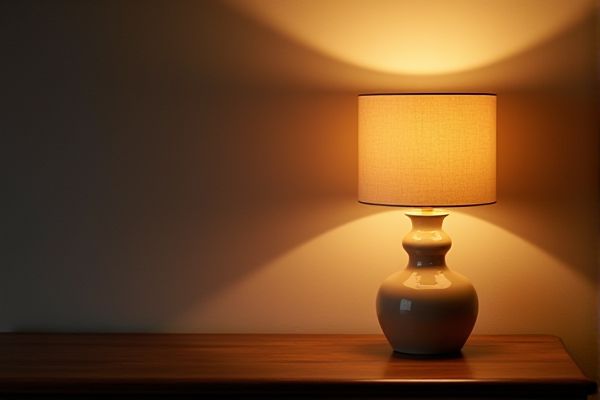
Floor lamps provide versatile lighting options and can illuminate larger spaces, while table lamps offer focused light ideal for desks or side tables, enhancing task performance and ambiance. Discover which lamp suits your needs best by exploring the rest of our article.
Table of Comparison
| Feature | Floor Lamp | Table Lamp |
|---|---|---|
| Size | Tall, stands on the floor (4-6 feet) | Compact, sits on tables or desks (1-3 feet) |
| Portability | Less portable, heavier | Highly portable, lightweight |
| Lighting Type | Ambient or task lighting, wide coverage | Focused task lighting, localized illumination |
| Placement | Floor corners, next to sofas or chairs | Desks, bedside tables, shelves |
| Power Source | Requires floor outlet access | Requires nearby outlet on furniture |
| Design Variety | Varied styles including arc and torchiere | Wide range of styles, lampshade options |
| Cost | Generally higher price range | Generally lower price range |
| Use Case | Room lighting, reading corners | Task lighting, decorative purposes |
Floor Lamp vs Table Lamp: Key Differences
Floor lamps provide broader ambient lighting and typically stand on the floor, making them ideal for illuminating larger spaces or corners. Table lamps offer localized lighting and fit on surfaces like desks or nightstands, perfect for tasks or accent lighting. Your choice depends on the room size, lighting needs, and available surface space.
Design and Aesthetic Appeal
Floor lamps offer a tall, elegant design that enhances room height and provides ambient lighting, making them ideal for spacious areas. Table lamps contribute to a cozy, intimate atmosphere with their compact size and diverse styles, perfect for bedside tables or desks. Your choice between floor lamp vs table lamp will depend on the room layout and your desired aesthetic impact.
Space and Placement Considerations
Floor lamps offer versatile placement options and are ideal for illuminating larger areas or corners without taking up surface space, making them perfect for open spaces or rooms with limited table surfaces. Table lamps require a flat surface like a side table, desk, or nightstand, which limits their placement but provides focused lighting ideal for reading or task-specific activities. Considering room size, furniture layout, and the intended lighting purpose is crucial when choosing between floor lamps and table lamps to optimize both space utilization and ambiance.
Lighting Functionality and Purpose
Floor lamps provide broader illumination ideal for lighting entire rooms or creating ambient light, making them suitable for living rooms or reading areas. Table lamps offer focused, task-specific lighting perfect for desks, bedside tables, or accentuating particular spaces. Both lighting options complement different functional needs, with floor lamps enhancing general ambiance and table lamps supporting detailed activities.
Energy Efficiency Comparison
Floor lamps generally consume more energy than table lamps due to their larger bulbs and higher wattage requirements, making table lamps a more energy-efficient option for localized lighting. LED bulbs in both floor and table lamps significantly reduce energy consumption, but choosing a table lamp with LED technology can optimize your energy savings in smaller spaces. Your energy costs can be minimized by selecting compact, low-wattage table lamps over bulky floor lamps that illuminate larger areas.
Adjustable Features and Flexibility
Floor lamps offer superior adjustable features and flexibility with their taller structures, allowing you to direct light across wider areas or focus it precisely for reading and ambiance. Table lamps, while more compact, provide convenient adjustability with swiveling heads or dimmable bulbs, ideal for task lighting on desks or bedside tables. Your choice depends on whether you need versatile room illumination or targeted, portable lighting solutions.
Ideal Rooms for Floor Lamps
Floor lamps are ideal for living rooms, bedrooms, and offices where they provide ambient or task lighting without taking up surface space. Their tall structure suits corners and next to sofas or reading chairs, creating focused illumination for reading or ambience. Floor lamps also enhance spaces with low natural light, offering versatility in adjusting brightness levels.
Best Uses for Table Lamps
Table lamps are ideal for providing focused lighting on desks, bedside tables, and reading nooks where direct illumination is needed. They enhance task-oriented activities such as studying, writing, and working on a computer by reducing eye strain through adjustable brightness levels. Their versatile designs and placement options make them suitable for accentuating room decor while offering practical lighting solutions.
Cost and Budget Considerations
Floor lamps typically range from $50 to $300, offering a cost-effective option for larger lighting needs without requiring additional furniture space. Table lamps generally cost between $30 and $200, making them budget-friendly choices for smaller areas or desks. Choosing between the two depends on space allocation and desired lighting intensity relative to the budget.
Choosing the Right Lamp for Your Needs
Floor lamps provide versatile lighting options and are ideal for illuminating larger spaces or creating ambient light in living rooms and bedrooms. Table lamps offer focused task lighting, perfect for reading, working, or accentuating decor on desks and nightstands. Selecting the right lamp depends on room size, lighting purpose, and placement flexibility to enhance both functionality and style.
 homyna.com
homyna.com